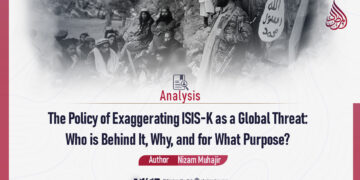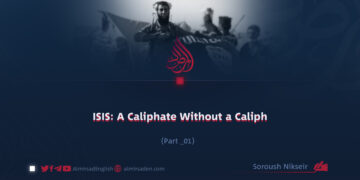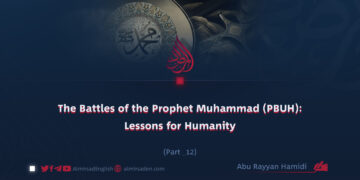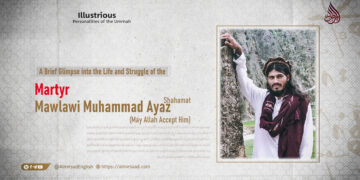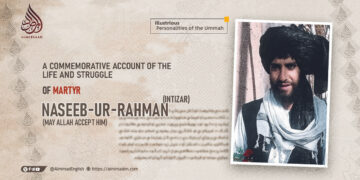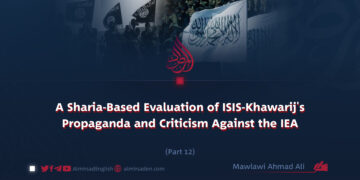Part 14
Author: Mawlawi Ahmad Ali
Imam Abu Al-Abbas, Ahmad ibn Muhammad ibn Al-Mahdi (may Allah have mercy on him):
Allama Abu Al-Abbas, Ahmad ibn Muhammad ibn Al-Mahdi (may Allah have mercy on him), in his Tafsir “Al-Bahr Al-Madeed”, volume 2, page 49, states:
﴿وَمَنْ يَّتَوَلَّهُمْ مِّنْكُمْ فَاِنَّهٗ مِنْهُمْ﴾
أي: من والاهم منكم فإنه من جملتهم.
Al-Baydawi comments:
قال البيضاوي: وهذا تشديد في وجوب مجانبتهم، كما قال صلّى الله عليه وسلّم: «المؤمنُ والمشركُ لا تَتَراءى نَارهَمَا» أو لأن الموالين لهم كانوا منافقين. هـ.
Ibn Atiyyah said:
وقال ابن عطية: من تولاهم بمعتقده ودينه فهو منهم في الكفر واستحقاق النقمة والخلود في النار، ومن تولاهم بأفعاله من العَضد ونحوه، دون معتقد ولا إخلال بإيمان، فهو منهم في المقت والمذمة الواقعة عليهم وعليه.
Allama Ibn Ashur (may Allah have mercy on him):
Imam Ibn Ashur (may Allah have mercy on him), in his tafsir Al-Tahrir wa Al-Tanweer (vol. 6, p. 230), under the verse:
﴿يٰۤاَيُّهَا الَّذِيْنَ اٰمَنُوْا لَا تَتَّخِذُوا الْيَهُوْدَ وَالنَّصٰرٰۤى اَوْلِيَآءَ م بَعْضُهُمْ اَوْلِيَآءُ بَعْضٍؕ وَمَنْ يَّتَوَلَّهُمْ مِّنْكُمْ فَاِنَّهٗ مِنْهُمْؕ اِنَّ اللّٰهَ لَا يَهْدِى الْقَوْمَ الظّٰلِمِيْنَ ٥١﴾
Translation:
“O you who have believed, do not take the Jews and Christians as allies. They are [in fact] allies of one another. And whoever is an ally to them among you – then indeed, he is [one] of them. Indeed, Allah does not guide the wrongdoing people.” (Surah Al-Ma’idah 51)
He elaborates that the plain meaning of the verse suggests that befriending disbelievers is equivalent to adopting their religion because partial association cannot exist without full inclusion in their faith. However, if a Muslim’s belief is firm, follows the Prophet (peace be upon him), and isn’t hypocritical, they remain a believer. Therefore, the verse requires interpretation.
The scholars have interpreted it in two ways:
1. “Alliance” refers to complete loyalty, including adhering to their religion and criticizing Islam.
2. This indicates a metaphorical similarity, meaning the person becomes similar to them in deserving punishment.
Ibn Ashur highlights the consensus of Ahl al-Sunnah scholars:
Ibn Ashur further clarifies: Scholars from Ahl al-Sunnah agree that unless a Muslim explicitly expresses agreement with disbelief or allies with disbelievers based on their disbelief, they do not leave the fold of Islam. However, such actions are considered a significant misguidance and sin.
He also mentions a dangerous type of alliance (muwalat) committed by some commanders and warriors in Andalusia who sided with Christians against Muslims. Andalusian scholars were consulted regarding this matter. While they declared it a great sin and disobedience to Allah and His Messenger, they did not issue a ruling of disbelief but regarded it as a severe misdeed.
Ibn Ashur (may Allah have mercy on him) stated that the scholars, in responding to this query, derived evidence from this verse, but they did not declare those individuals disbelievers. Rather, they interpreted the verse in a contextual manner. Furthermore, Ibn Ashur remarked that this type of alliance, committed by the Andalusian commanders and warriors, and the response given by the scholars regarding it, represents the most serious type of alliance after alliances that constitute outright disbelief (kufri muwalat).
Ibn Ashur (may Allah have mercy on him) states:
وَقَوْلُهُ: ﴿وَمَنْ يَّتَوَلَّهُمْ مِّنْكُمْ فَاِنَّهٗ مِنْهُمْ﴾ (مَنْ) شَرْطِيَّةٌ تَقْتَضِي أَنَّ كُلَّ مَنْ يَتَوَلَّاهُمْ يَصِيرُ وَاحِدًا مِنْهُمْ جَعَلَ وَلَايَتَهُمْ مُوجِبَةَ كَوْنِ الْمُتَوَلِّي مِنْهُمْ، وَهَذَا بِظَاهِرِهِ يَقْتَضِي أَنَّ وَلَايَتَهُمْ دُخُولٌ فِي مِلَّتِهِمْ؛ لِأَنَّ مَعْنَى الْبَعْضِيَّةِ هُنَا لَا يَسْتَقِيمُ إِلَّا بِالْكَوْنِ فِي دِينِهِمْ. وَلَمَّا كَانَ الْمُؤْمِنُ إِذَا اعْتَقَدَ عَقِيدَةَ الْإِيمَانِ وَاتَّبَعَ الرَّسُولَ وَلَمْ يُنَافِقْ كَانَ مُسْلِمًا لَا مَحَالَةَ، كَانَتِ الْآيَةُ بِحَاجَةٍ إِلَى التَّأْوِيلِ، وَقَدْ تَأَوَّلَهَا الْمُفَسِّرُونَ بِأَحَدِ تَأْوِيلَيْنِ: إِمَّا بِحَمْلِ الْوَلَايَةِ فِي قَوْلِهِ: ﴿وَمَنْ يَّتَوَلَّهُمْ﴾ عَلَى الْوَلَايَةِ الْكَامِلَةِ الّتي هِيَ الرّضى بِدِينِهِمْ وَالطَّعْنُ فِي دِينِ الْإِسْلَامِ، وَلِذَلِكَ قَالَ ابْنُ عَطِيَّةَ: وَمَنْ تَوَلَّاهُمْ بِمُعْتَقَدِهِ وَدِينِهِ فَهُوَ مِنْهُمْ فِي الْكُفْرِ وَالْخُلُودِ فِي النَّارِ.
وَإِمَّا بِتَأْوِيلِ قَوْلِهِ: ﴿فَاِنَّهٗ مِنْهُمْ﴾ عَلَى التَّشْبِيهِ الْبَلِيغِ، أَيْ فَهُوَ كَوَاحِدٍ مِنْهُمْ فِي اسْتِحْقَاقِ الْعَذَابِ. قَالَ ابْنُ عَطِيَّةَ: مَنْ تَوَلَّاهُمْ بِأَفْعَالِهِ مِنَ الْعَضْدِ وَنَحْوِهِ دُونَ مُعْتَقَدِهِمْ وَلَا إِخْلَالٍ بِالْإِيمَانِ فَهُوَ مِنْهُمْ فِي الْمَقْتِ وَالْمَذَمَّةِ الْوَاقِعَةِ عَلَيْهِمْ اهـ. وَهَذَا الْإِجْمَالُ فِي قَوْلِهِ: ﴿فَاِنَّهٗ مِنْهُمْ﴾ مُبَالَغَةٌ فِي التَّحْذِيرِ مِنْ مُوَالَاتِهِمْ فِي وَقْتِ نُزُولِ الْآيَةِ، فَاللَّهُ لَمْ يَرْضَ مِنَ الْمُسْلِمِينَ يَوْمَئِذٍ بِأَنْ يَتَوَلَّوُا الْيَهُودَ وَالنَّصَارَى؛ لِأَنَّ ذَلِكَ يُلْبِسُهُمْ بِالْمُنَافِقِينَ، وَقَدْ كَانَ أَمْرُ الْمُسلمين يَوْمئِذٍ في حَيْرَةٍ إِذْ كَانَ حَوْلَهُمُ الْمُنَافِقُونَ وَضُعَفَاءُ الْمُسْلِمِينَ وَالْيَهُودُ وَالْمُشْرِكُونَ، فَكَانَ مِنَ الْمُتَعَيَّنِ لِحِفْظِ الْجَامِعَةِ التَّجَرُّدُ عَنْ كُلِّ مَا تَتَطَرَّقُ مِنْهُ الرِّيبَةُ إِلَيْهِمْ.
وَقَدِ اتَّفَقَ عُلَمَاءُ السُّنَّةِ عَلَى أَنَّ مَا دُونُ الرِّضَا بِالْكُفْرِ وَمُمَالَأَتِهِمْ عَلَيْهِ مِنَ الْوَلَايَةِ لَا يُوجِبُ الْخُرُوجَ مِنَ الرِّبْقَةِ الْإِسْلَامِيَّةِ، وَلَكِنَّهُ ضَلَالٌ عَظِيمٌ، وَهُوَ مَرَاتِبُ فِي الْقُوَّةِ بِحَسَبِ قُوَّةِ الْمُوَالَاةِ وَبِاخْتِلَافِ أَحْوَالِ الْمُسْلِمِينَ.
The scholars of Ahl al-Sunnah wal-Jama’ah unanimously agreed that in those forms of association (moalaat) where there is no happiness or satisfaction with disbelief, nor cooperation based on that foundation, such allegiances do not expel a person from the fold of faith.
Explanation of “Rida” (Approval):
Scholars have defined Rida as:
“الرضا لغة قبول الشيء بسرور وغبطة والاطمنان به قلبًا دون ألم أو ضجر أو مشقة. (موسوعة المفاھیم الإسلامیة العامة، ص: ۳۱۵ ).
Linguistically, it means accepting something with happiness and contentment, without any pain, discomfort, or hardship. (Mawsu’ah al-Mafahim al-Islamiyyah, p. 315).
Purpose
Accepting a disbelieving religion with joy and inner tranquility—without any pain or hardship—according to this linguistic definition, constitutes رضا بالکفر (approval of disbelief).
Objective: If a person fully intends to accept a disbelieving religion, this is considered rida (acceptance) of disbelief.
Explanation: This means viewing a disbelieving religion with happiness and satisfaction in one’s heart constitutes Rida bil kufr (acceptance of disbelief).
(Source: Mu‘jam Al-Lughah Al-‘Arabiyyah Al-Mu‘asirah, Vol. 2, p. 904)
Purpose: If a person is pleased with disbelief in their heart, then according to this definition, it is considered Rida bil kufr (acceptance of disbelief).
“Rida (acceptance) means to be pleased with something and willingly accept it.”
(Source: Al-Mu‘jam Al-Waseet, Vol. 1, p. 351)
Therefore, being content with disbelief, approving of it, and accepting it wholeheartedly is classified as rida bil kufr according to this definition.
“Rida is the ultimate form of acceptance.”
(Source: Risalat Rad al-Rawafid, p. 10)
This implies that complete acceptance of disbelief, both outwardly and inwardly, falls under the concept of rida bil kufr.
Acceptance (Rida) refers to ultimate and complete approval, meaning full acceptance both outwardly and inwardly. Thus, if someone accepts disbelief (kufr) in such a manner, it is considered rida bil kufr according to this definition.
“Rida, according to the Hanafi scholars, is the fulfillment of choice and reaching its ultimate level.”
In summary, rida signifies an action where one’s approval of something reaches its peak. Therefore, if someone is pleased with and approves of disbelief to the highest degree (both externally and internally), this, by definition, constitutes rida bil kufr.
The second meaning, as defined by linguists:
“إیثار الشيء واستحسانه”
— preferring and approving something. Therefore, preferring disbelief (kufr), giving it precedence, and considering it admirable or good falls under rida bil kufr according to this definition. (Referenced from: “Al-Mufassal fi Sharh Ayat Al-Ikrah fi Al-Deen,” p. 139).
And Allama Ibn Ashur (may Allah have mercy on him) said:
وَأَعْظَمُ هَذِهِ الْمَرَاتِبِ الْقَضِيَّةُ الَّتِي حَدَثَتْ فِي بَعْضِ الْمُسْلِمِينَ مِنْ أَهْلِ غَرْنَاطَةَ الَّتِي سُئِلَ عَنْهَا فُقَهَاءُ غَرْنَاطَةَ: مُحَمَّدٌ الْمَوَّاقُ، وَمُحَمّد بن الأرزق، وعلي بن دَاوُود، وَمُحَمَّدُ الْجَعْدَالَةُ، وَمُحَمَّدٌ الْفَخَّارُ، وعلى الْقَلْصَادِيُّ، وَأَبُو حَامِدِ بْنُ الْحَسَنِ، وَمُحَمَّدُ بْنُ سَرْحُونَةَ، وَمُحَمَّدٌ الْمُشَذَّالِيُّ، وَعَبْدُ اللَّهِ الزَّلِيجِيُّ، وَمُحَمَّدٌ الْحَذَّامُ، وَأَحْمَدُ بْنُ عَبْدِ الْجَلِيلِ، وَمُحَمَّدُ بْنُ فَتْحٍ، وَمُحَمَّدُ بْنُ عَبْدِ الْبَرِّ، وَأَحْمَدُ الْبَقَنِيُّ، عَنْ عِصَابَةٍ مِنْ قُوَّادِ الأندلس وفرسانهم لجأوا إِلَى صَاحِبِ قَشْتَالَةَ (بِلَادِ النَّصَارَى) بَعْدَ كَائِنَةِ (اللِّسَانَةِ) – كَذَا- وَاسْتَنْصَرُوا بِهِ عَلَى الْمُسْلِمِينَ وَاعْتَصَمُوا بِحَبْلِ جِوَارِهِ وَسَكَنُوا أَرْضَ النَّصَارَى، فَهَلْ يَحِلُّ لِأَحَدٍ مِنَ الْمُسْلِمِينَ مُسَاعَدَتُهُمْ وَلِأَهْلِ مَدِينَةٍ أَوْ حصن أَن يأووهم.
فَأَجَابُوا بِأَنَّ رُكُونَهُمْ إِلَى الْكُفَّارِ وَاسْتِنْصَارَهُمْ بِهِمْ قَدْ دَخَلُوا بِهِ فِي وَعِيدِ قَوْلِهِ تَعَالَى: ﴿وَمَنْ يَّتَوَلَّهُمْ مِّنْكُمْ فَاِنَّهٗ مِنْهُمْ﴾ فَمَنْ أَعَانَهُمْ فَهُوَ مُعِينٌ عَلَى مَعْصِيَةِ اللَّهِ وَرَسُولِهِ، هَذَا مَا دَامُوا مُصِرِّينَ عَلَى فِعْلِهِمْ، فَإِنْ تَابُوا وَرَجَعُوا عَمَّا هُمْ عَلَيْهِ مِنَ الشِّقَاقِ وَالْخِلَافِ فَالْوَاجِبُ عَلَى الْمُسْلِمِينَ قَبُولُهُمْ.
فَاسْتِدْلَالُهُمْ فِي جَوَابِهِمْ بِهَذِهِ الْآيَةِ يَدُلُّ عَلَى أَنَّهُمْ تَأَوَّلُوهَا عَلَى مَعْنَى أَنَّهُ مِنْهُمْ فِي اسْتِحْقَاقِ الْمَقْتِ وَالْمَذَمَّةِ، وَهَذَا الَّذِي فَعَلُوهُ وَأَجَابَ عَنْهُ الْفُقَهَاءُ هُوَ أَعْظَمُ أَنْوَاعِ الْمُوَالَاةِ بَعْدَ مُوَالَاةِ الْكُفْرِ.
Regarding the verse: “And whoever allies with them among you, then indeed he is one of them” (Surah Al-Ma’idah: 51), and following it with verse 54: “O you who have believed, whoever among you turns back from his religion…”, Allama Ibn Ashur (رحمه الله) clarifies that the phrase “then indeed he is one of them” does not directly imply apostasy (irtidad), but rather serves as a warning or intensification. This is why the explicit verse concerning apostasy is mentioned afterward. This indicates that forming alliances and friendships with Jews and Christians can be a means that leads to apostasy. As he states:
فَجُمْلَةُ ﴿يٰۤاَيُّهَا الَّذِيْنَ اٰمَنُوْا مَنْ يَّرْتَدَّ مِنْكُمْ﴾ إِلَخْ مُعْتَرِضَةٌ بَيْنَ مَا قَبْلَهَا وَبَيْنَ جُمْلَةِ ﴿اِنَّما وَلِيُّكُمُ اللّٰهُ﴾ [الْمَائِدَة: 55]، دَعَتْ لِاعْتِرَاضِهَا مُنَاسَبَةُ الْإِنْذَارِ فِي قَوْلِهِ: ﴿وَمَنْ يَّتَوَلَّهُمْ مِّنْكُمْ فَاِنَّهٗ مِنْهُمْ﴾ [الْمَائِدَة: 51]. فَتَعْقِيبُهَا بِهَذَا الِاعْتِرَاضِ إِشَارَةٌ إِلَى أَنَّ اتِّخَاذَ الْيَهُودِ وَالنَّصَارَى أَوْلِيَاءَ ذَرِيعَةٌ لِلِارْتِدَادِ؛ لِأَنَّ اسْتِمْرَارَ فَرِيقٍ عَلَى مُوَالَاةِ الْيَهُودِ وَالنَّصَارَى مِنَ الْمُنَافِقِينَ وَضُعَفَاءِ الْإِيمَانِ يُخْشَى مِنْهُ أَنْ يَنْسَلَّ عَنِ الْإِيمَانِ فَرِيقٌ. وَأَنْبَأَ الْمُتَرَدِّدِينَ ضُعَفَاءَ الْإِيمَانِ بِأَنَّ الْإِسْلَامَ غَنِيٌّ عَنْهُمْ إِنْ عَزَمُوا عَلَى الِارْتِدَادِ إِلَى الْكُفْرِ.
Translation:
The phrase اِنَّما وَلِيُّكُمُ اللّٰهُ ‘O you who have believed, whoever among you turns back from his religion…’ is an interjected statement between the preceding and following verses, such as: ‘Your ally is none but Allah’ [Surah Al-Ma’idah: 55]. This interjection is motivated by the warning found in: ‘And whoever allies with them among you, then indeed he is one of them.’”
This interjection implies that befriending Jews and Christians serves as a means of leading to apostasy. The persistent allegiance of a group—whether hypocrites or those with weak faith—towards Jews and Christians raises the fear that they may eventually abandon their faith entirely.
Allah informs those who are hesitant and weak in faith that Islam does not need them if they resolve to abandon their religion and apostatize. Islam is independent of them and free from any reliance upon them.



